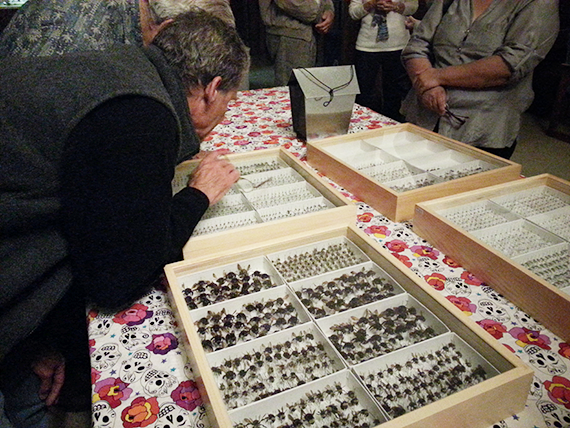By Noe Garcia
Santa Paula Times
The film “More Than Honey” was screened this past Friday at the Universalist Unitarian Church of Santa Paula. The film is a documentary that focuses on honeybee colonies from all around the world while also detailing man’s destruction and exploitation of this insect.
The Social Concerns Action Committee of the church sponsored the free screening and welcomed Dr. Ruben Alarcon, a bee biologist, as a guest who led a Q&A after the film. The committee screens a movie each month that deals with an issue with a dinner preceding.
The film was met with occasional gasps and laughs throughout as well as other sentiments such as, “stupid man,” or “are you kidding me?” People occasionally whispered something to the person next to them. One thing that was clear from the thunderous applause at the conclusion of the film was that the over 25 people in attendance learned a lot about bees and thought the film had much to offer. It showed everything from bees pollinating flowers and raising queens to something called “The Waggle Dance,” which allows a bee to communicate to its colony the location of flowers with nectar and pollen.
“Bees are a treasure and we really should do the best we possibly can by them,” Audrey Vincent, a filmgoer said. “I thought it was extraordinary and seeing several different kinds of scale of beekeeping.”
Margaret Wilson, film coordinator for the church, chose to screen “More Than Honey” because she believed it gave a thorough view about the current state of honeybees.
“I am feeling bad about the disrespect commercial bees get and how they’re treated to take all their honey and put on semis and moved around,” Wilson said. “I want to give a home in my garden to native bees.”
Dr. Ruben Alarcon, who has a Ph.D. in Biology, began his interest in the field in his grandma’s yard by playing with plants and looking at bugs. After the film, he was asked many questions such as the future of bees, how to attract them to a garden, and the diseases a bee can get. He answered questions for about 30 minutes and displayed four glass cases with hundreds of species of bees inside.
“[Bees] are important in producing our food,” Alarcon said. “It’s estimated about a third of what we eat is actually due to the work of honeybees. [The film’s] a pretty good representation of what’s going on with bees and really accurate.”
Many of the filmgoers made sure to thank Dr. Alarcon before they left with others still asking him questions. Dr. Alarcon has his own colony of bees for research and teaching at California State University Channel Islands where he’s an Assistant Professor of Biology. He hopes the film opens people’s eyes to what’s going on and how they’re being treated.
“At times, I was alarmed in seeing how inhumanely these insects are treated and how complicit we all are in that equation,” Charles Spink, a filmgoer, said. “It further raised my awareness of the complex relationship we have with bees in sustaining our food supply.”



